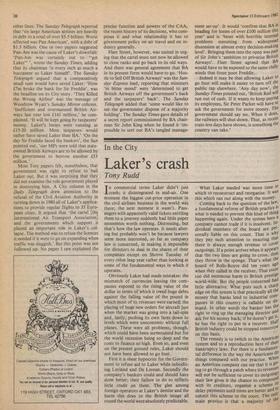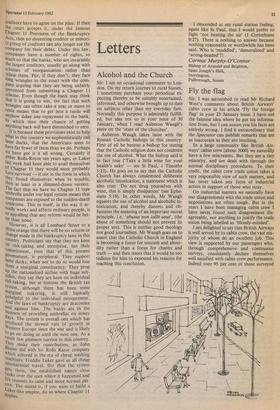In the City
Laker's crash
Tony Rudd
Tn commercial terms Laker didn't just Icrash; it disintegrated in mid-air. One moment the biggest cut-price operation in the civil airlines business in the world was there; the next moment it wasn't. Pass- engers with apparently valid tickets entitling them to a journey suddenly had little paper momentos worth nothing. Distressing, but that's how the law operates. It needs alter- ing but probably won't be because lawyers seem more interested, so far as company law is concerned, in making it impossible for directors to deal in the shares of their companies except on Shrove Tuesday of every other leap year rather than looking at some of the fundamental ways in which it operates.
Obviously Laker had made mistakes: the mismatch of currencies leaving the com- panies exposed to the rising value of the dollar in terms of which it owed huge debts against the falling value of the pound in which most of its revenues were earned; the placing of huge new orders for aircraft just when the market was going into a tail-spin and, lastly, pushing its own fares down to levels which were uneconomic without full planes. These were all problems, though, which could have been surmounted but for the world recession being so deep and the costs to finance so high. Even so, and even on the present ground rules, Laker should not have been allowed to go bust.
First it is sheer hypocrisy for the Govern- ment to refuse aid to Laker while subsidis- ing Leyland and De Lorean. Secondly the • company's bankers could and should have done better; their failure to do so reflects little credit pn them. The glee among foreign operators at Laker's demise and the harm this does to the British image all round the world were absolutely predictable. What Laker needed was more time in which to reconstruct and reorganise. It was this which ran out along with the money.
Coming back to the question of the law, a fundamental reform of British practice is what is needed to prevent this kind of thing happening again. Under the system here a company cannot trade if it is insolvent. In- dividual members of the board are per- sonally liable on this count. That is whY they pay such attention to ensuring that there is always enough revenue to cover outgoings. If a point arrives when it appears that the two lines are going to cross, then they throw in the sponge. That's what the board of Rolls-Royce did ten years ago when they called in the receiver. That event too did enormous harm to British prestige world-wide. But the people concerned had little alternative. What puts such a sharp edge on this system is that practically all the money that banks lend to industrial com- panies in this country is callable on de- mand. In other words the banker has the right to ring up the managing director and ask for his money back; if he doesn't get it:. he has the right to put in a receiver. FUJI British industry could be stopped tomorrow on this basis. The remedy is to switch to the American system and to a reproduction here of their bankruptcy laws. For there is a fundamen- tal difference in the way the Americans do things compared with our practice. When an American company can see that it is go- ing to go through a patch where its revenues will not be sufficient to cover its outgoings their law gives it the chance to compound with its creditors, organise a scheme t° delay payments until times are better and to submit this scheme to the court. The onlY main proviso is that a majority of the
creditors have to agree on the plan. If then the court accepts it, under the famous Chapter 11 Provision of the Bankruptcy Acts, then no dissenting creditor or minori- ty group of creditors can any longer sue the company for their debts. Under this law, companies have a number of rights, so Much so that the banks, who are invariably the largest creditors, usually go along with schemes of reorganisation rather than refuse them. For, if they don't, they face long wrangles in the court with the com- Pany arguing that they are being unfairly prevented from submitting a Chapter 11 scheme. Even though the bank may think that it is going to win, the fact that such wrangles can often take a year or more to settle means that to get into a tussle will anyhow delay any repayment to the bank, by which time their chance of getting anything back will have diminished to zero.
It is because these provisions exist to help What in this country we euphemistically call lame ducks, that the Americans seem to have far fewer of them than we do. Perhaps we have got it it all wrong. Certainly if either Rolls-Royce ten years ago, or Laker last week had been able to avail themselves of Chapter 11 they would most probably have survived — if not in the form in which they found themselves when in trouble, then at least in a slimmed-down version. The fact that we have no Chapter 11 type umbrella under our' legal system means that companies are exposed to the sudden-death syndrome. This in itself, in the way it ac- tually works and affects ordinary people, is s° appalling that any reform would be bet- ter than none.
However, it is all Lombard Street to a china orange that there will be no reform or change made in the bankruptcy laws in this country. Politicians say that they are keen on risk-taking and enterprise, but their commitment, even that of this present government, is peripheral. They support lame ducks, when not to do so would lose them a marginal constituency. They prop up the nationalised airline with huge sub- sidies, they say they are keen on individual tisk-taking, but at bottom the British tax system, although there has been some Marginal tinkering, is still basically unhelpful to the individual entrepreneur. And the laws of bankruptcy are draconian and against him. The banks are in the business of providing umbrellas on sunny days. The system is overall one which has Produced the slowest rate of growth in Western Europe since the War and is likely to go on doing so until the next one. As a result few pioneers survive in this country. They ey make their contribution, as John Bloom did with his Rolls Razor company Which ushered in the era of cheap washing Machines. Freddie Laker gave us all cheap international travel. But then the system gets them, the established names close ranks over the spot where it happened and ufe resumes its calm and more normal pat- tern. The moral is, if you want to build a Laker-like empire, do so where Chapter i 1 applies.











































 Previous page
Previous page